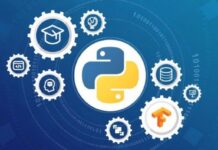One of the great advantages of data science is that many of the most advanced tools used by data scientists are free. In fact, the number of free tools in the industry is already very large, and sometimes it can be a headache, I don’t know how to choose. To help you determine which tools you should choose, here are five free software tools worth knowing about data processing.
Anaconda Distribution
Python has become a great tool in the field of data science because a large number of developers have built Python-based data science libraries. For data scientists working in Python, libraries such as NumPy, SciPy, panda, and scikit-learn are essential. Unfortunately, even for the most experienced developers, dealing with all of these Python libraries is a challenge. They can be difficult to install, and many rely on some software other than Python.
Anaconda is a free Python distribution and package manager that solves this problem. The Anaconda Python distribution comes pre-installed with more than 200 of the most popular data science Python libraries, and its package manager provides an easy way to install over 2,000 additional packages without worrying about software dependencies. Anaconda comes with many other popular tools, including Jupyter Notebook, which enables data scientists to work interactively in a browser-based environment.
RStudio & RStudio Server
RStudio is an integrated development environment (IDE) tailored for performing interactive data analysis and more formal programming in the R language. RStudio provides a perfect balance for an interactive work environment that supports R consoles and data visualization panels, as well as a full-featured text editor for syntax highlighting and code completion.
One less well-known tool is RStudio Server, a full-featured version of the RStudio IDE that runs on the server and is accessible through a browser. This means you can access RStudio IDE from anywhere via a network connection and transfer computing to dedicated resources. This allows data scientists to process potentially sensitive data without having to download it to a personal device, or perform complex and computationally intensive work with R on any device.
OpenRefine
Originally developed by Google engineers, OpenRefine is an open source tool for data cleansing. It allows practitioners to read confusing or corrupted data, perform batch conversions to fix errors, generate clean data, and export the results in a range of useful formats.
One of the best features of OpenRefine is that it tracks every action performed on a dataset, making step tracking and workflow re-creation very easy. This is especially useful when you have many files with the same data integrity issues and you need the same conversion. OpenRefine allows you to export a sequence of changes made to the first data file and apply it to a second data file, saving you the time of rework and reducing the possibility of human error.
OpenRefine also provides a very powerful tool for handling messy text fields. For example, if there is a column in the data set, the entry is “Vancouver, BC.” , “VANCOUVER BC” and “vancouver bc”, OpenRefine’s text clustering tool will recognize that they may be the same and perform a batch conversion to apply a single label to each event.
Apache Airflow
In most organizations, data is not stored in one place, nor is it accessed using only one method. There are often multiple databases, data storage systems, APIs, and other processes to track data across the organization. The data team’s main job is to move the data from where it resides to where it needs to be analyzed and convert as needed. Ideally, this work should be as automated as possible, and Apache Airflow can do that.
Airflow was developed by Airbnb engineers for internal use and was open sourced in 2015. It is a tool for mapping, automating, and scheduling complex workflows that involve many different systems with interdependencies. It monitors the success of these processes and alerts engineers when problems arise. Airflow also has a web-based user interface that represents the workflow as a small job network so that dependencies can be easily visualized.
H2O
With the maturity of machine learning technology, some basic algorithms have been widely used. Generalized linear models, tree-based models, and neural networks have become essential elements in machine learning toolkits. However, although many implementations of algorithms in R and Python are useful for prototyping and proof of concept, they do not scale well into production environments.
H2O is an open source tool that provides an efficient and scalable implementation of the most popular statistical and machine learning algorithms. It can connect to many different types of data storage systems and can run on any device, from laptops to large computing clusters. It has powerful and flexible tools for building model prototypes and fine-tuning, and the models built in H2O are very easy to deploy into production environments. Most importantly, H2O has Python and R APIs, so data scientists can seamlessly integrate it with existing environments.
There are so many software tools in the field of data science. When the project starts, it is a good choice to choose a good enough free tool to speed up and optimize the data flow.































